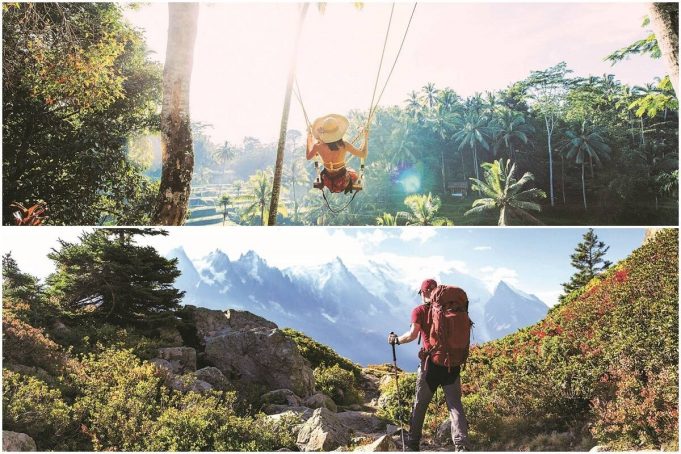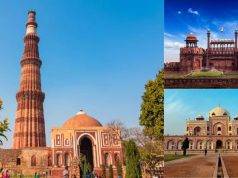When the world opens up, which hopefully might happen in the coming months, the one thing people would like to make up for the most is travel. However, travel may not be carefree and without caution at least this year. And, both consumers and the travel and hospitality industry are geared up for that.
As per a Booking.com global report predicting the future of travel in 2021, about 65% people are excited about traveling again after lockdowns and 38% will plan a trip to make up for a celebration missed due to coronavirus. The report says travellers will look for a heightened level of travel safety and more sustainable travel offerings, as well as evolve their preferences for where and with whom they travel. Newfound appreciation for doorstep delights will endure alongside an abiding love of the far-flung, and travellers will find new ways to blur the lines between work and travel. All of which will catapult a demand for deeper value from the trips booked in the future.
Gloria Guevara, president and CEO, World Travel & Tourism Council (WTTC), says travelling in the ‘new normal’ age requires coordinated actions, including new standards and protocols “for a safe and responsible road to recovery for the global travel and tourism sector as consumers start planning trips again”.
That special trip
The first trip should be a special one after the lockdown. Travel agencies like Thomas Cook India suggest local and long family stays, road trips to unknown destinations, luxury travel and increased use of non-hotel accommodations will be in huge demand. A stay in a planter’s villa in Kerala, ocean suites or water bungalows in the Maldives, a luxurious experience at Dubai’s Atlantis, and experiences like a jeep safari amidst the lush plantations of Munnar, a unique bush-dining experience in Bandhavgarh, mangrove walks in the Sundarbans or the heady adrenalin rush of bungee jumping in Rishikesh could be exciting options.
“Ease of travel restrictions and resurgence in domestic tourism has made consumers keen to explore unknown places. Hence, we created the hidden gems portfolio with unique experiences. Customer behaviour and booking trends reveal that as Indians were unable to holiday in 2020, a combination of pent-up travel demand and health/safety concerns are resulting in a new found interest in affordable luxury packages with bookings for global brands given their focus on hygiene protocols. In the face of travel and health protocols, Indians are opting for the ease of mono-destination vacations with extended stays,” says Rajeev Kale, president & country head, holidays, MICE, Visa, Thomas Cook India.
Destinations like Maldives, Dubai, Goa, Andaman, Himachal, Rajasthan and Kerala will be in good demand, feels Daniel D’souza, president and country head, leisure, SOTC Travel, who conducted the SOTC Travel Holiday Readiness Report recently based on customer perceptions for holiday travel post-pandemic. “We expect a surge in demand for private homes and boutique properties with local guides in 2021, eclectic accommodation such as colonial bungalow, heritage properties, palaces and travel insurance,” adds D’souza who feels Drivcations (driving vacations) and multi-generational staycations will see an uptick in the post-Covid-19 travel landscape.
Touchless travel
Technology has played a key role in driving demand and innovation. Touchless travel will accelerate for some time. The notion of touching grubby menus or interacting with airport kiosks will undergo massive changes.
From pre-packed and sealed meals, immunity passports, global airline strategy firm SimpliFlying predicted more than 70 ways in which air travel will be different in future. Expect, for instance, the use of personal devices to grow as passengers would avoid touching seat-back screens. There will be no cash transactions, or passengers wiping their own seats. A social-distancing-friendly class, touchless cabin, in-flight janitor and a document to prove immunity will play a critical role, besides, self-service technologies at every step will facilitate passenger flow, cutting queues while ensuring a social distancing-friendly passenger experience.
Hotels and restaurants will opt for contactless arrivals and dining experiences. Some brands like Club Mahindra of Mahindra Holidays & Resorts India even offer Covid insurance, travel insurance, testing, and car sanitation services.
Digital menus, QR codes and mobile orders will redefine dining out. Like My Menu, a specialised digital tablet menu service provider, has launched a QR ordering solution to enable better display information of the menu. Eating out platform EazyDiner’s Safe+Dining is a safety programme for restaurants and diners for real-time feedback on hygiene standards. With a demand for technology solutions like inventory and wastage management, dining out tech platform Dineout has launched technology for hotels to reserve time slots at gym, spa and laundry services, besides in-room dining technology while maintaining the least contact possible.
Healthy halts
Given the challenges faced in 2020, Indians look towards travel as a transformative experience. “They want to spend time interacting with their surrounds and locals – to enjoy a more immersive experience. This year has been challenging for working professionals who seek wellness and spiritual breaks to Goa, Coorg, Himachal and Kerala,” says Kale.
Brands continue to offer enriching experiences of a destination’s local community. Like ‘Hyatt Loves Local’ initiative, a global effort by Hyatt hotels to collaborate with small businesses that have been impacted by the pandemic, has more than 60 Hyatt hotels and resorts in destinations across the Americas, Asia Pacific, Europe and the Middle East to provide complimentary resources and exposure to select local businesses. Examples are Andaz Delhi sourcing local produce from certified organic and sustainable producers, Grand Hyatt Kochi Bolgatty collaborating with representatives from Kerala government-run female-empowerment mission Kudumbashree to offer indigenous products made by women across the district.
Farm-to-table concept is here to stay as most people will turn to healthy and immunity boosting eating. Kandima Maldives, a lifestyle resort, has The Fresh Lab, which sources fresh produce from island farms. The Residence by Cenizaro, independent luxury resorts in Maldives, Indonesia, Mauritius, Zanzibar and Tunis, has pioneered an initiative called the Earth Basket an on-site kitchen farm to develop their unique needs, compost food waste in-house and provide rich varieties of zero-kilometre produce.
Responsible, green travel policies and active measures will be a priority for a healthy world. Ankita Sheth, co-founder of Vista Rooms, a chain of luxury holiday homes across India, has properties with farm kitchens, solar power and waste management system, pet-friendly and wheelchair friendly. She feels, “Especially after the pandemic, there is an increasing concern for living in the natural environment. More people value the importance of health, opt for rural and wildlife exploration and open to support green travel policies and experiential stays with nature. This will be an important decision driver in travel planning in the near future.”
The new travel pass
The International Air Transport Association (IATA) is in the final stages of developing a digital vaccine passport for travellers. Governments and airlines may begin requiring travellers to get the immunisation and prove it with a new form of digital documentation called a vaccine passport. Thus, proof of the vaccine will be a new travel document. Tests and masks will stick around-even after a vaccine approval.
While announcements on the vaccine have already seen positive consumer sentiment, a digital health passport would be of value to ensure ease and convenience in facilitating travel across borders, while ensuring strong checks are in place, feels Kale of Thomas Cook India.
With the revival of the sector, mass vaccination drives in nations like the UK, US and Russia can give rise to ‘vaccine tourism’ packages that may include a small tour to the destination, a visit to the health centre for the vaccination, the cost of which will be included in the package.









